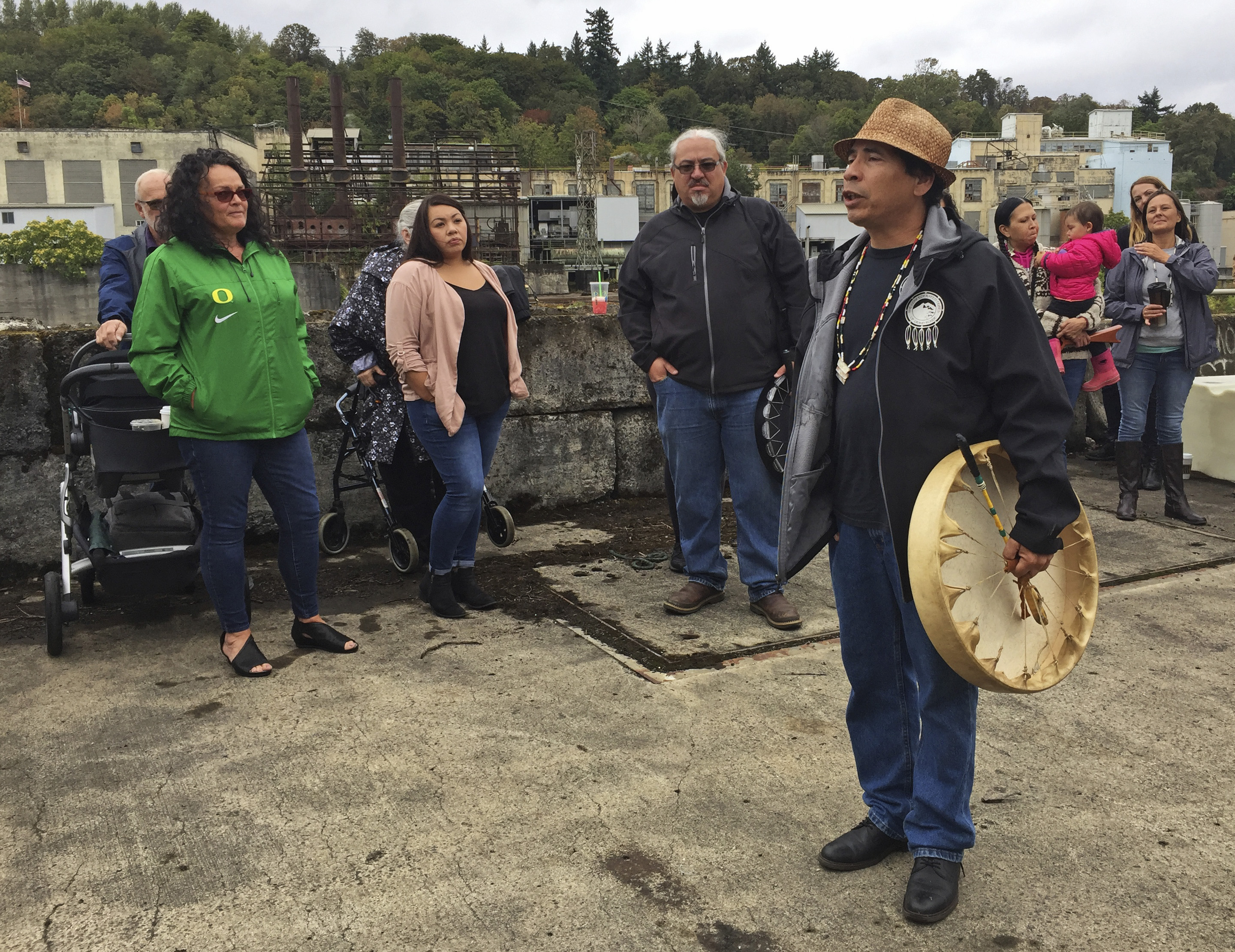Tribal Government & News
Tribe blesses Blue Heron Paper Mill site in Oregon City

By Danielle Frost
Smoke Signals staff writer
OREGON CITY -- With the backdrop of Willamette Falls shrouded in gray sky and the smell of sage hanging in the air, the Confederated Tribes of Grand Ronde blessed its recently purchased land at the former Blue Heron Paper Mill site.
By all accounts, it was an emotional day, marking the first time the Tribe has owned property at Willamette Falls since the area was ceded to the federal government in 1855. The blessing on Monday, Sept. 9, marked the close of one chapter and the beginning of the next.
Approximately 60 Tribal members, Elders, staff, family and other government officials attended the event held at the long-shuttered mill’s waterfront.
Tribal Council Chairwoman Cheryle A. Kennedy, Secretary Jon A. George and Tribal Council members Kathleen George, Denise Harvey, Jack Giffen Jr., Lisa Leno and Michael Langley attended the blessing, along with General Manager David Fullerton, Lands Department Manager Jan Reibach, Finance Manager Chris Leno, Natural Resources Department Manager Michael Wilson, Tribal Engineering and Public Works Manager Jesse White and Tribal Council Chief of Staff Stacia Hernandez.
Tribal Elder and Cultural Consultant Greg Archuleta welcomed attendees in Chinuk Wawa and English.
“I’m very happy to be here today, as this is a very special time,” Archuleta said. “This land has been returned to the Tribe. We’re very grateful for the Tribal Council members who had this vision. There are many families who have ties here and we will all be able to fish here.”
Archuleta also thanked Natural Resources and Cultural Resources department employees for their contributions.
“Our ancestral lands go the entire length of the Willamette River,” Archuleta said. “It is important that the fish can continue to pass through here.”
He said that for many years the federal government tried to keep Tribal people away from Willamette Falls, but they continued to return. Entries in the U.S. Army’s passbook at Fort Yamhill show that Tribal members returned to the falls even after their removal to the Reservation.
“They wanted to make us farmers (on the Reservation), but the land wasn’t good for that, so our people would come here to fish and take it back to Grand Ronde,” Archuleta said.
After he spoke, Tribal drummers Jade Unger, Cultural Advisor Bobby Mercier, Cultural Education Coordinator Jordan Mercier, Chris Rempel, Historic Preservation Manager Briece Edwards, Enrollment Officer Nick LaBonte and Jon A. George opened the ceremony with a drum song.
Kennedy, who is descended from the chiefs who controlled access to the falls, led the invocation. She asked for a blessing on the land and water, and gave thanks that a piece of the Tribe’s homelands had finally been reclaimed.
The site holds significant historical and cultural importance to the Tribe. It was once home to the Charcowah village of the Clowewalla (Willamette band of Tumwaters) and the Kosh-huk-shix village of Clackamas people, who were both forcibly removed from Willamette Falls and relocated to the Grand Ronde Reservation in the 1850s.
The purchase is a continuation of the Tribe’s reconnection with the falls. In October 2018, the Tribe built a removable platform at the falls, which allows Tribal members to traditionally fish using dipnets. Tribal fishermen returned to the site in May and caught the first fish from the platform.
Tribal officials finalized the $15.25 million purchase of the 23-acre Blue Heron site from Washington developer George Heidgerken in August. The developer and his family attended Monday’s blessing.
Bobby Mercier spoke in Chinuk Wawa, asking attendees to remember the villages and people who once lived where the site was located, gaining sustenance from Pacific lamprey and salmon caught at the falls.
“Now, we are bringing our words, laughter and songs to put everything back here,” Mercier said. “We are here once again asking for that teaching, to give each one of us the tools so that when we are gone and leave this to our children, we can pass on the knowledge to them. We were taken away from here, but our hearts were not. We want our ancestors to know we have been doing things the best we know how.”
As it began to rain lightly, Mercier and other Tribal drummers closed with a song to honor their ancestors.
“Ancestors, please help us,” he said. “We thank you for everything. We don’t forget your struggles. And today, we have come full circle.”
Afterward, Jon A. George said a highlight of the morning was seeing everyone gathered at the waterfront.
“We have returned to our lands here,” he said. “We will look to our ancestors as we develop this area. The gathering of the people today makes it so special. It’s a very emotional day and shows how important this is, caring for the land and the water here again.”
The Tribe has committed $3 million to clean up the property, which has been used for numerous industrial purposes since the 19th century and includes more than 50 buildings.
The proposed Riverwalk, a public walkway along the eastern shore of the Willamette River, would have a significant presence on the Blue Heron site.
Metro, the regional Portland area government, is sending a $475 million bond measure to voters in November that would include $20 million for the Riverwalk project.
A second property that Tribal Council approved purchasing in July is still in the closing stages and includes 1.5 miles of land bordering the Blue Heron site.
